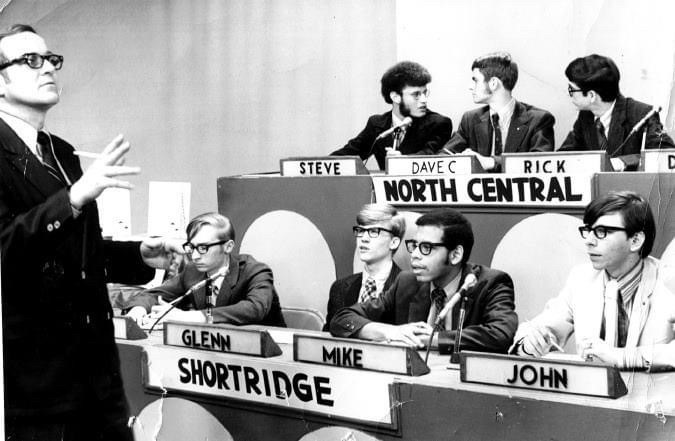
Most high school kids fantasize about winning some version of the Big Game.
With their peers cheering from the sidelines, they dream of making the decisive penalty kick, hitting the game-winning three-pointer, or kicking a field goal as time expires.
My good friends Kevin Kelso, Mike Goler, John Shaw and I couldn’t do any of those things. But we knew quite a lot about particle physics and the names of Henry VIII’s six wives – which qualified us to represent Shortridge High School in a local 30-minute weekly game show on Channel 13 called Exercise in Knowledge (later named The Brain Game). In a March Madness-style single elimination tournament, teams from 32 high schools in the greater Indianapolis area competed throughout the school year with the hope of winning it all in a final showdown in the month of May.
It was our own version of the Big Game. I dreamed about somehow getting there every day during our senior year.
We practiced relentlessly. We each cultivated specialties in “quiz team” trivia – chemistry, literature, art, history, biology, and general knowledge.
John was our designated math whiz. Every Exercise inKnowledge match featured a four-part math problem. Each member of the team had to complete one part, then pass the paper to the left. Which team could get that paper to the finish line first with the right answer? Since math was definitely a “secondary strength” in my life, I typically scrawled an encouraging message and sent the problem as fast as I could towards John, our anchor.
We breezed through our first few matches. Looking at the draw, we realized that if we kept winning, we just might square off for the title with North Central High School – a gang of four exceedingly bright students whom we knew and respected. OK, outright feared.
As you can see in the vintage photo above from May 1971 (black and white photography was still considered cool), our dream final match did happen. And yes, it does appear that we had all shopped at the same store – Eyeglasses for Nerds.
The match went well.
I remember that about halfway through the show, Rob Stone, the host, said, “Here is a poem: ‘Glory be to God for dappled things…’” I rang in after the first seven words: “That’s Pied Beauty, by Gerard Manley Hopkins.” That was correct, and I knew that my 12th grade English teacher would go to bed that night knowing that her efforts to teach us about Victorian poets had not been in vain.
We gradually built a lead and never looked back. That evening Shortridge High School was crowned champion of Exercise in Knowledge. We had won the Big Game and felt on top of the world.
Except, that’s not how I really felt.
A half century is a very long time. But I can remember as if it were yesterday what I was thinking when I left the Channel 13 studio and stepped out into the warm spring evening:
I thought this was going to be the biggest thing that ever happened in my life. But apparently this isn’t it. I was surprised. Disappointed. Disillusioned.
For the first time in my life – and certainly not the last – I had experienced what the early Christian theologian Augustine of Hippo identified as the central dilemma of every human being. We suffer from “disordered loves.” We abandon ourselves to worthy endeavors – to dream jobs, dream relationships, and dream achievements – only to discover that they are not capable of providing ultimate meaning for our lives. Augustine asserted that it’s OK to love many things. But whenever we love anything more than God, we will always end up disappointed.
People typically love less important things more, and more important things less. The result is the disorder of our lives caused by the disorder of our loves.
That’s because, to put it simply, you are what you love.
Author and pastor Tim Keller writes, “There is nothing wrong with loving your work, but if you love it more than your family, then your loves are out of order and you may ruin your family. Or if you love making money more than you love justice, then you will exploit your employees, again, because your loves are disordered.”
The goal is not to stop loving our jobs, our hobbies, our friendships, and even “quiz team” trivia. It’s to love God more than all those things. That allows our “lesser loves” to fall into their proper places, where we can really appreciate them for the good things they are (instead of the ultimate things we sometimes turn them into).
Immediately after my surge of disillusionment standing outside the TV studio, I felt a surge of hope.
Four months earlier I had become a follower of Jesus. It suddenly occurred to me, as it never had before, that perhaps there was something / Someone who would never, in the end, let me down.
It was a turning point in my life.
The British playwright Oscar Wilde cynically observed, “In this world there are only two tragedies. One is not getting what one wants, and the other is getting it.”
Those who have endeavored to follow Jesus might offer this wisdom instead:
The greatest tragedy in life is never discovering from experience that the one thing we all truly want is God – and that he will never disappoint us.
